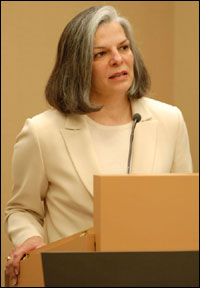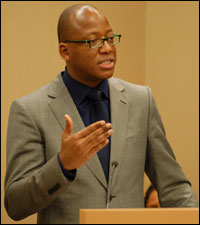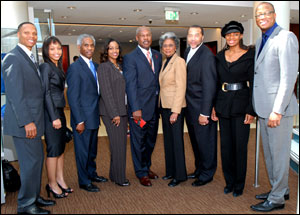CDC In the News
Heightened National Response to the HIV/AIDS Crisis among African Americans
Published: March 14, 2007

CDC Director Julie Gerberding, MD, MPH, gave opening remarks at Heightened National Response to the HIV/AIDS Crisis among African Americans: A Meeting with African-American Leaders.
Influential leaders from the African-American community, faith- and community-based organizations, entertainment, and public health came together at a partnership meeting on March 8, to strengthen our nation's response to the high rates of HIV/AIDS among African Americans.
The event, entitled Heightened National Response to the HIV/AIDS Crisis among African Americans: A Meeting with African-American Leaders, will help kick off CDC's enhanced national mobilization effort that will build upon the growing momentum in the community to address the HIV/AIDS crisis among African Americans.
End the Complacency that Surrounds the Disease
"You can't solve big problems with small investments. You need big investments to solve big problems," acknowledged CDC Director Julie L. Gerberding, MD, MPH, during welcoming remarks.
Attendance at the meeting alone, cautioned Gerberding, was not going to end the crisis and everyone in the room had to commit to "ending the complacency that surrounds the disease."
Gerberding also articulated the need for capacity building among CDC's partners and a renewed focus on connectivity. "The whole is greater than the sum of its parts. Partnerships, and specifically, diversity in partnerships, are one of the most effective methods to reaching a goal, and making a difference."
Kevin Fenton, MD, PhD, director of the National Center for HIV/AIDS, Viral Hepatitis, STD, and TB Prevention (proposed), spoke of the palpable excitement in the room and his eagerness to work with new partners to put an end to the spread of HIV/AIDS among African Americans.

Kevin Fenton, MD, PhD, NCHHSTP director, speaking to participants at the meeting which brought together African-American leaders to address the HIV/AIDS crisis among African Americans..
"Race and ethnicity, by themselves, are not risk factors for HIV infection," Fenton said. "However, because of a complex set of historical, structural, environmental, and cultural factors—including racism and discrimination, poverty, denial, stigma, homophobia, and limited access to health care—African Americans are more vulnerable to HIV infection."
He added, "It was unacceptable to let the epidemic get this far and there is no time to waste."
African-American Leaders and Celebrities Pledge Support
During the meeting, African-American leaders and celebrities, including Nancy Wilson and Susan Taylor, pledged numerous commitments to intensify HIV prevention efforts, and many shared personal testimonies.Phill Wilson, founder and executive director of the Black AIDS Institute, stressed the importance of family. "…we are a family. We are a part of a human family, and the only way for our human family to survive is for each of us to do our part…sadly, our family is not well. Our family has AIDS."
Wilson called on leaders to build a "black AIDS mobilization" to end the debilitating stigma of HIV/AIDS in the black community. African-American leaders responded by sharing their personal and organizational commitments to increase awareness, communicate more about HIV/AIDS, and to encourage African Americans to seek early diagnosis and treatment.

Among those attending the event: Ronnie Devoe, CEO Devoe Brokers Associates, and spouse, Shamari Devoe; Bill Wells, president, National Black MBA Association; actress Bernadette Stanis; George Roberts, PhD, DHAP; Jazz vocalist Nancy Wilson; Thomas Dortch, chairman of the Board, Black College Alumni Hall of Fame; Susan Taylor, editorial director, Essence magazine; and Kevin Fenton, MD, PhD, NCHHSTP
The leaders represented such diverse organizations as The Links, Jack and Jill, the Coalition of 100 Black Women, The Urban League, and the 100 Black Men of America. There were also representatives from Historically Black Colleges and Universities, megachurches, and large corporations such as Aetna and UPS.
Roberta Shields, mother of hip-hop star Ludacris and president of The Ludacris Foundation, pledged an intensified effort to promote HIV/AIDS awareness via the Foundation's website. She also pledged to continue to "speak within her circle of influence," targeting young fans of hip-hop music.
Darian "Big Tigger" Morgan, BET television host, offered to become an "ambassador for AIDS," using his celebrity and communication channels to promote HIV testing and prevention among youth.
Bishop Eddie Long of New Birth Missionary Baptist Church pledged to be "the face of AIDS," and to use his television broadcast to bring about greater awareness.
HIV: A Persistent and Pervasive Threat
HIV remains a persistent and pervasive threat to the health, well-being, and human potential of many African Americans.
- In 2005, blacks made up approximately 13 percent of the population, but accounted for nearly half (49 percent) of new HIV diagnoses in the 33 states with long-term, confidential, name-based HIV reporting.
- Black men are especially hard hit. They account for two-thirds of all new HIV diagnoses among blacks in the 33 states with long-term HIV reporting, and their rate of HIV diagnosis is nearly seven times higher than for white men and twice that of black women. The majority (52 percent) of black men's cases are among gay and bisexual men. In fact, in a recent study of MSM in five cities, 46 percent of blacks were infected with HIV, compared with 21 percent of whites and 17 percent of Hispanics.
- Black women are also severely affected—though they account for one-third of new HIV cases among blacks in the 33 states with long-term HIV reporting—their rate of HIV diagnosis is more than 20 times higher than that of white women.
- In 2004, HIV was the fourth-leading cause of death among blacks aged 25-44 years in the United States.
John Maupin, DDS, MBA, president of Morehouse School of Medicine, committed to creating a center of excellence for the training of student health personnel working on college campuses to provide HIV testing and counseling.
Donald Bowen, senior vice president at the Urban League promised to use his influence to direct resources toward HIV prevention and to use the Urban League's network of local affiliates to disseminate HIV prevention information and materials within African-American communities.
Rhythm and blues artist Lyfe Jennings lamented that there were too few songs about HIV/AIDS and committed to recording a song about AIDS on his next album.
Report Card of Commitments
Upon receiving numerous verbal and written commitments from notable African-American leaders, Fenton assured the attendees that CDC will be compiling the commitments into a singular document and that a report-card-style evaluation system will be in place to ensure that all commitments are being met.
To support the heightened response, an article and report, respectively titled, " Racial/Ethnic Disparities in Diagnoses of HIV/AIDS—33 States, 2001-2005 ," was published in the Morbidity and Mortality Weekly Report (MMWR) , and A Heightened National Response to the HIV/AIDS Crisis among African Americans (PDF, 3.29 MB , published by the National Center for HIV, STD, and TB Prevention
The report and plan include plans to intensify programs in the following four key areas over the next three years:
- Expand the reach of prevention services;
- Increase opportunities for diagnosing and treating HIV;
- Develop new, effective prevention interventions; and
- Mobilize broader community action.
For more information concerning HIV/AIDS among African Americans, including CDC's Heightened Response, please visit the HIV/AIDS and African Americans page on CDC.gov.
Page last modified: April 19, 2007
